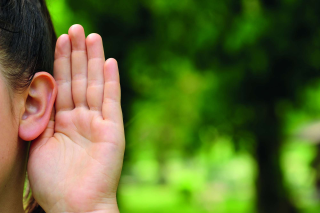Posted Tuesday February 28, 2023
Adapted from a blog by audiologist Dr Amy Sarow
Hearing loss can have a cascade of effects on mental health, cognitive function, and even earning potential and healthcare expenses.
Here are 7 good reasons not to ‘wait and see’. These are just a few reasons why treating hearing loss can improve quality of life and lead to a longer, healthier life.
- Improves communication abilities.
Getting treatment for hearing loss as soon as it is discovered will ensure your quality of life isn’t impacted by communication difficulties. Hearing aids can help you hear more clearly, which will improve your communication skills and allow you to participate in conversations and activities you may have been avoiding. - Promotes safety.
Untreated hearing loss can put your safety at risk: it can make it difficult to hear sirens, approaching vehicles, or alarms. - Supports earnings.
Investing in hearing aids could actually save money in the long term. Estimates speculate that employees with untreated hearing loss, on average lose $30,000 per year in annual salary potential. Additionally, they have an additional $22,434 in healthcare costs over ten years compared to patients with normal hearing. - Preserves memory.
Wearing hearing aids regularly can help make information easier to understand, which can facilitate improved memory function and delay dementia. A study has shown that people with untreated hearing loss were 24% more likely to develop dementia over a period of six years than those without hearing loss. One theory about this is that hearing loss causes changes in the brain which lead to dementia. - Promotes social engagement.
Wearing hearing aids improves communication abilities to preserve social connections and reduce feelings of isolation. As it becomes more and more difficult to communicate, those with hearing loss may withdraw from social activities, which can lead to isolation and depression. Hearing loss can also cause problems at work as it becomes difficult to hear important instructions or colleagues. - Reduces the risk of falls.
A John Hopkins study found that those with hearing loss were three times more likely to fall than those without hearing loss. Hearing loss causes problems with balance and environmental awareness, both of which can lead to falls. For seniors, falls are the number one cause of death or injury. - Supports mental health.
Treating hearing loss can reduce effects on mental health and have an impact on sleep quality. Research shows that untreated hearing loss can lead to anxiety, depression and sleep problems. One study found that those with sensorineural hearing loss were more likely to experience clinical depression and anxiety.
Reading list for more information
Bisogno, A., Scarpa, A., Di Girolamo, S., De Luca, P., Cassandro, C., Viola, P., Ricciardiello, F., Greco, A., De Vincentiis, M., Ralli, M., & Di Stadio, A. (2021). Hearing loss and cognitive impairment: Epidemiology, common pathophysiological findings, and treatment considerations. Life, 11(10), 1102.
Kochkin, S. (2010). Marketrak VIII: The efficacy of hearing aids in achieving compensation equity in the Workplace. The Hearing Journal, 63(10), 19–24. https://doi.org/10.1097/01.hj.0000389923.80044.e6
Li, C.-M., Zhang, X., Hoffman, H. J., Cotch, M. F., Themann, C. L., & Wilson, M. R. (2014). Hearing impairment associated with depression in US adults, National Health and Nutrition Examination Survey 2005-2010. JAMA Otolaryngology–Head & Neck Surgery, 140(4), 293.https://doi.org/10.1001/jamaoto.2014.42
Li, C.-M., Zhang, X., Hoffman, H. J., Cotch, M. F., Themann, C. L., & Wilson, M. R. (2014). Hearing impairment associated with depression in US adults, National Health and Nutrition Examination Survey 2005-2010. JAMA Otolaryngology–Head & Neck Surgery, 140(4), 293. https://doi.org/10.1001/jamaoto.2014.42
Lin, F. R., Yaffe, K., Xia, J., Xue, Q.-L., Harris, T. B., Purchase-Helzner, E., Satterfield, S., Ayonayon, H. N., Ferrucci, L., Simonsick, E. M., & Health ABC Study Group, for the. (2013). Hearing loss and cognitive decline in older adults. JAMA Internal Medicine, 173(4), 293.https://doi.org/10.1001/jamainternmed.2013.1868
Lin, H. W., Mahboubi, H., & Bhattacharyya, N. (2018). Self-reported hearing difficulty and risk of accidental injury in US adults, 2007 to 2015. JAMA Otolaryngology–Head & Neck Surgery, 144(5), 413. https://doi.org/10.1001/jamaoto.2018.0039
Moreland B, Kakara R, Henry A. Trends in Nonfatal Falls and Fall-Related Injuries Among Adults Aged ≥65 Years — United States, 2012–2018 (2020). MMWR Morb Mortal Wkly Rep; 69: 875–881. https://dx.doi.org/10.15585/mmwr.mm6927a5external icon
Pereira-Jorge, M. R., Andrade, K. C., Palhano-Fontes, F. X., Diniz, P. R., Sturzbecher, M., Santos, A. C., & Araujo, D. B. (2018). Anatomical and functional MRI changes after one year of auditory rehabilitation with hearing aids. Neural Plasticity, 1–13. https://doi.org/10.1155/2018/9303674



